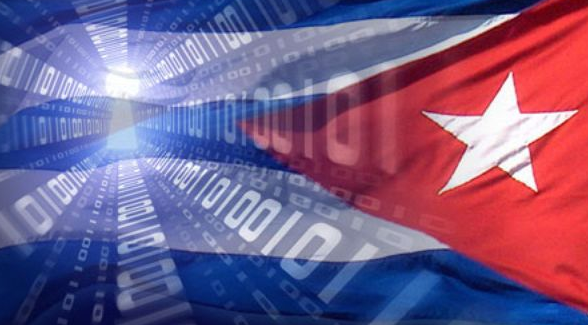aNewDomain — Cuba connected to the Internet in 1996, but three factors stifled it: the US embargo, economic depression during what the Cubans call the “special period” after the disintegration of the Soviet Union and the Cuban government’s fear of free information, which was also fed in part by the Soviet collapse.
As Raúl Castro said in 1997, “Glasnost, which undermined the USSR and other socialist countries consisted in handing over the mass media, one by one, to the enemies of socialism.”
Cuba, he said, would not make the same mistake.
What a difference two decades make.
Now, 20 years later, time has eroded each of the factors that once stifled Cuba’s earlier try at building its Internet infrastructure.
The US embargo no longer matters much, after all: China and other nations have filled the gap left by US Internet infrastructure suppliers — Huawei has replaced Cisco and China played a major role in the financing and construction of the undersea cable connecting Cuba and Venezuela. And, while Cuba remains poor, the economy has improved since the special period and there is frustrated demand for Internet service. This should have fueled government and/or private investment, but it has not. Cuba’s Human Development Index — a measure of national income, health and education — is the second highest in Latin America and the Caribbean. (But it still is the least connected nation in the region.)
Finally, there’s Cuba’s longstanding fear of free information. Now, the Cuban government usually points to USAID projects like ZunZuneo and the Alan Gross affair as proof of a US war on the regime. That makes for good propaganda — and it provides an excuse for Cuba’s lame Internet — but I think Cuba’s leaders know better.
They are smart enough to realize that these efforts, had they succeeded, would have been drops in the bucket.
Furthermore, Cuba has had twenty years to observe nations like China, nations that encourage the Internet while selectively blocking content and, more important, surveilling users.
So what is stopping the Cuban Internet today?
Or, to take a concrete example, why would ETECSA, Cuba’s Internet/phone/mobile monopoly, want to deploy outdated DSL in homes or 3G mobile technology? Who makes such bogus decisions and why?
I’ll tell you what the problem is.
The problem is bureaucracy and all the problems bureaucracy brings: fear of competition, change and stepping out of line.
Consider AP journalist Michael Weissenstein’s coverage of the recent Communist Party Congress for a minute. He reports that “Raúl Castro blamed ‘an obsolete mentality’ and ‘attitude of inertia’ for the state’s failure to implement reforms meant to increase productivity.”
He goes on to state that First Vice President Miguel Diaz-Canel, long seen as Castro’s successor, agreed, saying that obsolete ways of thinking led both to inertia in enacting reforms and “a lack of confidence in the future.”
“Along with other deficiencies, there’s a lack of readiness, high standards and control, and little foresight or initiative from sectors and bureaucrats in charge of making these goals a reality,” he said.
Look. If you question what Castro and Diaz-Canel are saying, check out the goofy list of occupations that are eligible for self-employment in Cuba.
Then read New York Times columnist David Brooks’ experience as a member of a delegation of distinguished American writers, artists, musicians, and cultural leaders that traveled to Cuba last week.
Brooks wrote:
The country has many things going against it as it tries to make the journey. It suffers from the dysfunctions that afflict countries that have giant bureaucratic states lying heavy on society. Those at the top have been trained all their lives to regulate and control. The governing elites speak (at great length) in lifeless ideological jargon.
It would be depressing if that were the end of the story, so let me digress on what makes Brooks optimistic. When he met with Cuban artists, he felt “a sense of national solidarity and a confident patriotic spirit that is today lacking in the United States.” He attributes Cuban national pride to their impressive cultural achievements and singles out the writing and life of José Martí, the 19th-century poet and journalist “who shifted the national imagination, who told Cubans who they were and what their story was” — inspiring a “common faith in a dignified future.”
Martí died fighting for Cuban independence from Spain, but feared the possibility of a cultural and economic takeover by the United States. You have to admire a man who both sides of the Cuba debate claim as theirs.
He is Cuba’s national hero, but, when the Reagan administration began broadcasting “Radio Free Europe/Radio Free Liberty” to Cuba, they named it “Radio Martí” and Obama honored him during his recent Cuban trip. Brooks writes that he “was amazed how much Martí’s name came up in conversation [during the trip] and how little Fidel Castro’s did.”
Returning to the Internet, many nations have made transitions since the dissolution of the Soviet Union — Cuba is only the latest. Cuba can consider and learn from the Internet strategies of nations from Estonia to Russia. That should be an easy choice.
The grip of bureaucracy on the Cuban Internet is not unique. Bureaucracy arises wherever game-playing, not merit, determines success. Excellence and hard work — “rate busting” — can become liabilities if squandered in this way.
Cuba is also free to consider the Internet infrastructure ownership and regulation policies of non-Soviet governments and create a uniquely Cuban Internet — one that benefits the Cuban people and provides ideas for the rest of the world.
The old guard leaders and bureaucracy made a strong showing at the recent party congress, and their view may prevail — the future of Cuba and the Cuban Internet is uncertain. As José Martí said “The problem of independence did not lie in a change of forms but in change of spirit.”
For aNewDomain, I’m Larry Press.
Cover image: LatinAmericanPost.com, All Rights Reserved.













